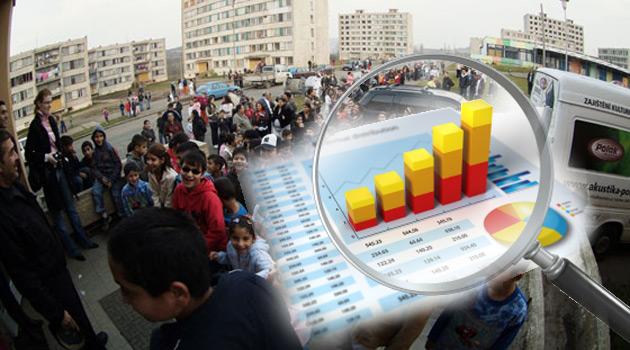Magdalena Karvayová on estimating the distribution of Roma in the schools: Data are important to desegregation

The Seznam Zprávy news server is reporting that, as is customary, the principals of nursery schools, primary schools and secondary schools throughout the Czech Republic currently have until 10 October to complete the registration of statistics for their schools. The Czech Education Ministry has once again added a section to the registry that some consider problematic: Qualified estimates of the number of Romani pupils in the schools.
The ministry needs numbers about how many Romani children are in the schools in order fulfill its strategic documents about the integration of Romani people. The information is also required because of a judgment from the European Court of Human Rights that is still under supervision according to which Romani children have been recommended for enrollment into what were once called “special schools” without justification.
How to do a qualified estimate
“I have not registered that anybody wrote down their Romani nationality when enrolling for math class, and I am not qualified to do a qualified estimate,” said the principal of a primary school in the Ústecký Region when refusing to complete the Education Ministry’s form asking for this information – she does not want to reveal her name publicly. Štefan Klíma, the principal of the Integrated Secondary School in Mladá Boleslav, explained his approach to the issue as follows: “I don’t know how to do a qualified estimate, so each year I complete this form with a zero.”
“I believe it may be unlawful for us to do this estimate and nobody has ever told me how I am to recognize whether a pupil is or is not Romani,” Klíma said. The Pedagogical Chamber (Pedagogická komora), an association of which some principals and teachers in the Czech Republic are members, is currently recommending principals complete the reports with zeroes.
As long ago as the year 2006, however, the Czech Government Council for Romani Minority Affairs and the Czech Labor and Social Affairs Ministry issued the following definition, and it can aid principals in making qualified estimates of the number of Romani pupils in their schools: “We consider a Romani person to be an individual who considers herself or himself Romani, without necessarily identifying herself or himself as such under all circumstances (e.g., during the census), and/or an individual who is considered Romani by a significant proportion of those around her or him on the basis of actual or assumed indicators (anthropological, cultural or social).” The Education Ministry needs to ascertain this data about Romani pupils and their distribution.
“The qualified estimate of the number of Romani pupils and students is designed to document the process of the fulfillment of the judgment of the European Court of Human Rights in the matter of D.H. and Others versus the Czech Republic,” confirmed ministerial spokesperson Aneta Lednová. Štěpán Drahokoupil of the Open Society Fund in the Czech Republic has said that “We know Romani pupils are being segregated away from everybody else, but we do not have any objective data supporting that claim.”
“We need exactly these qualified estimates from the principals, otherwise we will just be involved with individual cases,” Drahokoupil said. Czech Ombudswoman Anna Šabatová has found that Romani children are educated 12 times more frequently in programs for pupils with mild mental disability than non-Romani pupils are.
Experts agree with collecting data on ethnicity
While many Romani people also believe the collection of data on ethnicity is “racist” and unacceptable, experts who are more closely involved with the problem of social exclusion and segregated education are in favor of it. According to Romani community member Magdalena Karvayová of the Awen Amenca organization, it is the purpose for which the ministry is collecting the numbers that is important.
“It’s important this data be collected in order for desegregation measures to be designed,” Karvayová said. Six years ago, Romani community member and journalist Patrik Banga told news server Romea.cz the following: “I welcome this collection of data… If we are meant to confirm our allegations that Romani children are being relegated to the ‘special schools’ on the basis of their ethnicity, I see no better way to prove that. The numbers are the best argument. Personally I would add data from the educational counseling centers as well.”
“It is a big problem that without such data, the state administration’s picture of the situation is not a realistic one. The bureaucrats and politicians who should be involving in correcting the causes of negative phenomena in society are able to propose solutions just on the basis of estimates or impressions. Some methods are much less effective than they could be if there were more detailed knowledge of the situation,” said Zdeněk Ryšavý, director of the ROMEA organization, at a seminar on this issue.
“If this society is meant to aid us Roma somehow, then it’s necessary to have data. I am an indigenous Czech Rom. Our community was subjected to several inventories in the past, and we know who abused those inventories later on – for example, the repressive units of the state. Despite that, as a Romani person, I am also aware there is an enormous problem here – for that reason, I agree with the collection of data about us,” said Čeněk Růžička, chair of the Committee for the Redress of the Roma Holocaust in the Czech Republic.
According to Petr Torák, a Romani emigré from the Czech Republic who worked as a police officer in Great Britain until 2017, the collection of data on ethnicity in relation to crime is an ordinary procedure there. British police officers are tasked with recording both the citizenship and ethnicity of the persons they encounter while performing their duties.
If somebody does not want to state her or his ethnicity, a British police officer has the option of listing the ethnicity that seems likely. “The police in England have the duty to register the ethnicity of all the people with whom they come into contact during the execution of their jobs. Each officer has a daily log into which he or she records those cases,” he told news server Romea.cz.
